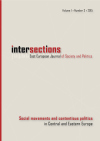From the Same Starting Points to Moderate versus Radical Solutions
From the Same Starting Points to Moderate versus Radical Solutions
Hungarian Case Study on the Political Socialization of Young LMP and Jobbik Party Political Activists
Author(s): Nóra Anna Lantos, Anna KendeSubject(s): Social Sciences, Governance, Politics and society
Published by: MTA Társadalomtudományi Kutatóközpont Kisebbsegkutató Intézet
Keywords: Political Socialization; Youth Activism; Political Participation; Post-communist Hungary
Summary/Abstract: In line with the general tendency in post-communist societies, several waves of youth research reported the low interest in politics amongst young people in Hungary from late 1990s until 2010 (Csákó et al., 1999; Bognár, 2010; Gazsó and Laki, 2000; Örkény, 2000; Gazsó and Szabó, 2002; Szabó, 2009). However, two political movements emerged that successfully attracted young supporters and managed to enter the Hungarian parliament in 2010: LMP, a center-leftist party, and Jobbik, a radical rightist party.In-depth interviews with four young LMP and four Jobbik activists were carried out to examine how different agents of socialization contributed to political participation, and the influences that determine whether one or the other path is chosen, i.e., a democratic, leftist, or a radical rightist one. Informal socialization agents, such as the family and peer influences and political events played an important role in political socialization, while the influence of formal agents, such as school education was missing. The groups shared the same events as clues to their political awakening. In spite of starting from their shared generational community, they chose different solutions according to the ideologies stemming from their political socialization.Our results about the lack of institutional influences on political socialization indicates the relevance of fostering future changes in the role of schools in conveying norms for democracy.
Journal: Intersections. East European Journal of Society and Politics
- Issue Year: 1/2015
- Issue No: 3
- Page Range: 59-80
- Page Count: 22
- Language: English

